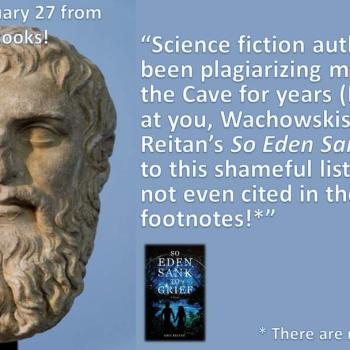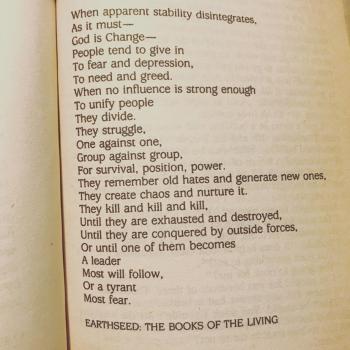Of the theological topics that I tackle in my book Theology and Science Fiction, one that students at McCormick Seminary were particularly interested in when I made a guest appearance there in October, was what I wrote about immortality. And yet it was a topic that we didn’t get to talk about as much as I would have liked. And so I was happy that it came up in my conversation with Doug Estes, in the second podcast episode we recorded. Listen to the first part first if you haven’t already done so, and then continue with this week’s episode after that – or just dive in here, if you prefer. Also be sure to check out the interview he did for Christianity Today. In it he says:
Technology has always been used in a way that has had some good and some bad. People create things, hoping it will do good. Immediately somebody uses the exact same thing for something bad. That is an inescapable part of living in this world. I don’t see a way around it. You can’t be in a non-technological world, because everything we’ve ever created, our culture and civilization, is based on tech.
Moving on to the focus in this particular podcast episode and blog post, science fiction provides a good opportunity to talk about the afterlife. Even within Doctor Who alone, one thinks of multiple episodes that are relevant. One is The Five Doctors, which features a time lord who is seeking Rassilon’s secret of immortality – only to find that it isn’t the wonderful thing he hoped it would be. The immortals in Enlightenment are bored, which is one reason they use mortals as their playthings. Mawdryn Undead also deals with endless life – and the desire to end it. All three of those episodes are from the same season of Doctor Who! Then there is the more recent character of Ashildr and the way her ongoing life highlights another issue: the memory capacity of the brain is limited, and so endless life extension in bodily form would require ongoing forgetting to make way for new memories, or a completely different sort of brain with endless capacity.
Positing that raises the same issues as the view that humans will be transformed so as to be rendered incapable of sin. The big question is this: If we can be transformed to be that way, why not make us that way to begin with? Positing that makes the problem of evil or the more difficult.
On this topic, I also recommend Dan Simmons’ Hyperion Cantos, in which the discovery of an organism called a cruciform transforms the church, offering the possibility of living forever through it by a process of resurrection very different from that which ancient Judaism and the New Testament talk about.
Also relevant are the Earthseed books by Octavia Butler, which focus on a tangible hope that humankind’s future involves spreading among the stars – a literal heaven replacing hope for an ethereal afterlife.
A key question to ask that is often neglected is this: Is death inherent in creatureliness? Many treat death as though it were never intended, and results from God cursing the Earth and inflicting it as judgment on humankind. But there is room for a more positive views of death, as the Jewish scriptures, read contextually, makes clear.
Also related to this topic, IO9 had an article that compared different science fiction afterlives. There are different ways of living forever, and in some ways it would make more sense to posit that God’s eternity is timelessness rather than endless duration, and to envisage humans sharing it that – as in a sense we already do, if there is such a thing.
Talking about technology in heaven with Doug, I was also led to think about the depiction of the battle of Armageddon in the Brick Testament…
There has also been plenty related to the topics of resurrection and afterlife as they pertain to biblical studies. In addition to the article on Ancient Jew Review, see also the following:
https://ehrmanblog.org/did-paul-belief-in-that-the-fleshly-body-would-be-resurrected/
http://www.patheos.com/blogs/rationaldoubt/2018/08/the-new-testaments-biggest-cover-up-jesus-died-twice/?utm_source=facebook&utm_medium=social&utm_campaign=FBCP-PATH&utm_content=Oct2018&fbclid=IwAR2xyzvpMwFukU9UnYd58a-BVq9f0AkLwqzdCyTCKq5c2Cic8hsvQEtHiAs
See also John MacDonald’s posts about whether time travel is possible, and this video from Gen Con 2018 if you still haven’t had enough!





















